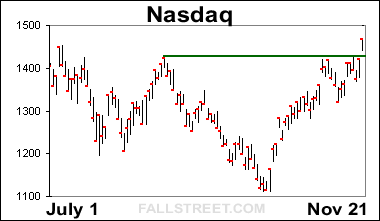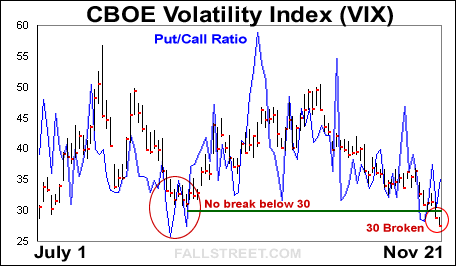November 21, 2002 6:30 PM
Tech Topples Previous Top -- Investor Greed Grows
The Dow gained 222 points (2.58%) and the Nasdaq tacked on 48 (3.45%) with volume at 2.04 billion and 2.44 billion respectively. Advancers more than doubled decliners on both exchanges and up volume dominated down volume across the board. Additionally, the VIX declined by 1.29 points to settle at 27.37. Since closing at a high of 49.48 on October 9 the VIX has declined in 19 of the last 32 sessions. The put/call ratio, which last peaked above 1 on November 8, has also seen a steady, yet choppy decline. However, the put/call ratio ticked a little higher today to close at 0.75 (versus 0.63 yesterday).
Backing today’s big equities move was three economic reports and better than expected results from HP. On the economic front, jobless claims dropped in the latest week, Leading Indicators stabilized in October, and the Philadelphia Fed Survey improved. Of these three reports the Philly Fed is the most noteworthy, as it is for the month of November. By contrast, jobless claims can be misleading week to week and are still running close to 400K (the previous week was revised higher from 388K to 401K), and Leading indicators were for October. As for HP, the company beat estimates and posted strong revenue gains.
Tech’s Spark Excitement
Fueled by HP’s results tech stocks caught fire today. In fact, within a few minutes of trade the Nasdaq had moved strongly above its August highs (Aug 22) – a level which the averaged failed to break on two previous occasions. The break above this level was like pouring gasoline on a fire: fund managers and technical players piled into tech at the expense of consumer stocks, and bonds.
 |
Even though consumer and oil stocks failed to participate in the rally – Dow components KO, PG, MO, WMT, XOM were all down – strength did materialize in autos. In fact, GM was up more than 9% while Ford tacked on more than 15%. There were no noteworthy developments in autos.
GE Warns and Soars
GE downgraded earnings estimates and warned of a $1.4 billion fourth quarter charge today and its shares jumped by more than 8%. At first the warning and subsequent jump in GE shares may seem odd. However, two analysts previously warned that GE would take the charge, and their estimates had been as high as $2 billion. As such, you could say that GE’s warning was ‘better than expected’. Yes, this is the type of logic that people were using to justify the sharp rally in GE’s shares following an earnings warning.
Herd Gathering but May Not Charge
The VIX, which can be a signal of a gathering herd mentality, has continued its trend lower since the markets ‘bottomed’ in October. Moreover, at 27 the VIX still has further room to decline before any warning signals begin to flash (a reading below 20 is regarded as warning that investors are too complacent). However, simply because the VIX could decliner further this does not mean that it will, and/or that stock price will rise. Rather, during previous bear market rallies the VIX has bottomed out well before reaching 20.
 |
Quite frankly, the markets are rallying because the markets are rallying. Just as excessive investor fear helped send the Dow down to 7,197, excessive greed could take the Dow back above 9,000. You can not pinpoint at what level ‘fear’ and ‘greed’ are running at. Rather, and as Buffett says, you look to buy when others are fearful and sell when others are greedy.
Are the markets displaying signs of investor greed right now? I would speculate yes. After all, even if a company like GE meets its high EPS target for next year ($1.70) its shares would still be trading at 16 times 2003 earnings today. Yes, a forward P/E of 16 is meaningless, as the markets do not adhere to multiple considerations alone. However, it would be a lot easier to believe that the current rally has staying power if companies like GE were upgrading, not downgrading expectations, and forward P/Es were lower. Moreover, and in the case of GE, it would be a lot easier to decipher the quality of its earnings if asset sales, SPE gains, pension income and other things were not influencing the data to the upside.
|
|